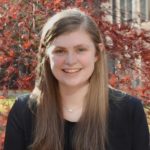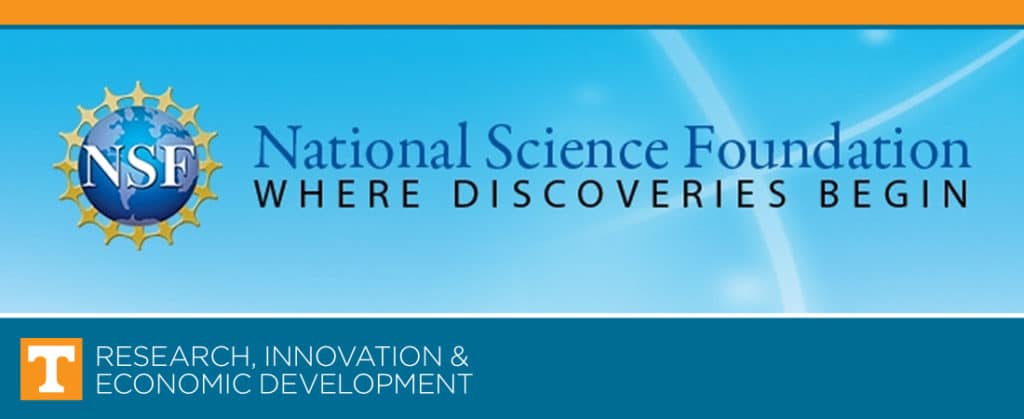Five University of Tennessee, Knoxville students have been selected to be a part of the 2022 National Science Foundation’s Graduate Research Fellowship Program
The students receiving fellowships are:
Ashley Babjac of Dallas, Texas
Department of Electrical Engineering and Computer Science
 Babjac’s research explores applications of machine and deep learning models to various bioinformatics domains. Her project currently involves using autoencoders to reduce high-dimensional datasets and modeling DNA/mRNA sequences with the use of novel Natural Language Processing (NLP) strategies in combination with transformer networks. These types of models will lead to ground-breaking biological insights with many applications including healthcare, agriculture, and infrastructure.
Babjac’s research explores applications of machine and deep learning models to various bioinformatics domains. Her project currently involves using autoencoders to reduce high-dimensional datasets and modeling DNA/mRNA sequences with the use of novel Natural Language Processing (NLP) strategies in combination with transformer networks. These types of models will lead to ground-breaking biological insights with many applications including healthcare, agriculture, and infrastructure.
Keri Burge of Madison, Alabama
Department of Anthropology
 Burge’s proposed project uses stable isotope analysis of archaeological materials to better understand the effects of environmental and sociopolitical factors on historical agropastoral risk management strategies in the Andes. The goal of this project is to produce data-based evidence of past human-environment interactions that can then be used to bridge the gap between archaeologists and climate change policy makers in order to become an ally to indigenous peoples who are advocating for climate justice in their lives.
Burge’s proposed project uses stable isotope analysis of archaeological materials to better understand the effects of environmental and sociopolitical factors on historical agropastoral risk management strategies in the Andes. The goal of this project is to produce data-based evidence of past human-environment interactions that can then be used to bridge the gap between archaeologists and climate change policy makers in order to become an ally to indigenous peoples who are advocating for climate justice in their lives.
Tyler Cultice of Springfield, Ohio
Department of Electrical Engineering and Computer Science
 Cultice’s research focuses on the cybersecurity of quantum computers by utilizing quantum properties to create novel security primitives, which provide the building blocks for higher level security strategies. His work seeks to propose new designs, applications, and frameworks for the emerging field of quantum computation.
Cultice’s research focuses on the cybersecurity of quantum computers by utilizing quantum properties to create novel security primitives, which provide the building blocks for higher level security strategies. His work seeks to propose new designs, applications, and frameworks for the emerging field of quantum computation.
Logan Dunn of Maryville, Tennessee
Department of Biochemistry and Cellular and Molecular Biology
 As part of the Krishnan lab, Dunn’s research seeks to understand the mechanisms of how neurons reorganize connections in response to learning and experience. Using a female mouse model of Rett Syndrome, a severe neurodevelopmental disorder, Dunn is working to better understand the role of the protein MECP2 (methyl-CpG-binding protein 2) in this process. Specifically, he is interested in investigating how the dysregulated expression of MECP2 over time within distinct types of neurons results in dysregulated neuroplasticity.
As part of the Krishnan lab, Dunn’s research seeks to understand the mechanisms of how neurons reorganize connections in response to learning and experience. Using a female mouse model of Rett Syndrome, a severe neurodevelopmental disorder, Dunn is working to better understand the role of the protein MECP2 (methyl-CpG-binding protein 2) in this process. Specifically, he is interested in investigating how the dysregulated expression of MECP2 over time within distinct types of neurons results in dysregulated neuroplasticity.
Alivia Nytko of Knoxville, Tennessee
Department of Ecology and Evolutionary Biology
 The goal of Nytko’s research is to understand how coupled plant-atmosphere and plant-soil feedbacks vary along aridity gradients. Studying these interdependent feedbacks together will show if and how feedbacks govern biogeochemical processes to maintain ecosystem resilience to a dynamic climate. Through the integration of above- and below-ground feedback loops, Nytko’s research will elucidate how environmental gradients can affect the ecology and evolution of ecosystems and shape the interactions that enable species to persist under rapid anthropogenic climate change.
The goal of Nytko’s research is to understand how coupled plant-atmosphere and plant-soil feedbacks vary along aridity gradients. Studying these interdependent feedbacks together will show if and how feedbacks govern biogeochemical processes to maintain ecosystem resilience to a dynamic climate. Through the integration of above- and below-ground feedback loops, Nytko’s research will elucidate how environmental gradients can affect the ecology and evolution of ecosystems and shape the interactions that enable species to persist under rapid anthropogenic climate change.
Four additional UT students received honorable mentions:
- Scarlett Wilson—Department of Physics and Astronomy
- Kaitlyn Toth—Department of Electrical Engineering and Computer Science
- Harini Radhakrishnan— Department of Physics and Astronomy
- Sarina Mitchell—Department of Microbiology
The NSF Graduate Research Fellowship Program supports outstanding graduate students in science, technology, engineering, and mathematics fields who are pursuing research-based graduate degrees. As the oldest graduate fellowship of its kind, GRFP has a history of selecting recipients who achieve high levels of success academically and professionally.
Since 1952, NSF has funded over 60,000 Graduate Research Fellowships out of more than 500,000 applicants. Currently, forty-two Fellows have gone on to become Nobel laureates, and more than 450 have become members of the National Academy of Sciences.
Rising seniors intending to apply for the NSF Graduate Research Fellowship should contact UT’s Office of Undergraduate Research and Fellowships at onsf@utk.edu. Graduate students are encouraged to work with their departmental supervisors and the Graduate School.
